TICAD
Tokyo International Conference on African Development (TICAD)
Ministerial Meeting (Overview)
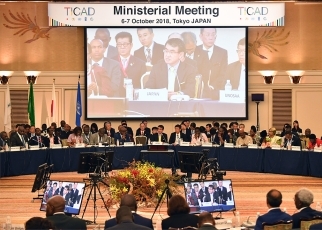
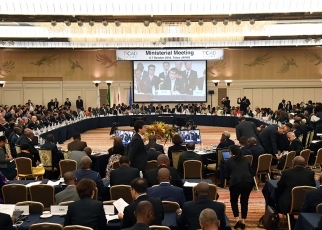
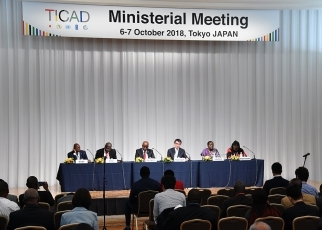
The Tokyo International Conference on African Development (TICAD) Ministerial Meeting was held in Tokyo on October 6 and 7. The overview of the meeting is as follows. Mr. Taro Kono, Minister for Foreign Affairs, Mr. Masahisa Sato, State Minister for Foreign Affairs, Mr. Kenji Yamada, Parliamentary Vice-Minister for Foreign Affairs and Mr. Kiyoto Tsuji, Parliamentary Vice-Minister for Foreign Affairs attended as the representatives of Japan. Foreign Minister Kono served as one of the co-chairs along with the representatives of the other TICAD co-organizers (the United Nations, the United Nations Development Programme (UNDP), the World Bank, and the African Union Commission (AUC)) and African Union Chair (Rwanda).
1. Attendees and program
(1) Attendees:
Approximately a total of 2,100 people including representatives of 52 African countries (Heads of Delegation: 24 vice-prime minister/ foreign ministers, and 16 other ministers and ministerial-ranked officials) as well as development partner countries, international and regional institutions, civil society, and private companies participated in the TICAD Ministerial Meeting and its side events organized by relevant organizations such as Ministry of Environment of Japan, City of Yokohama, JICA, JETRO, World Bank, UNDP, UNEP and UN-Habitat on the margins of the meeting.
(2) Program:
October 6 (Saturday)
- Opening Session
- Plenary 1 (Trends and Challenges since TICAD VI)
- Plenary 2 (Economic Transformation for Inclusive Growth)
October 7(Sunday)
- Plenary 3 (Healthy, Sustainable and Stable Society for Human Security)
- Plenary 4 (Strengthening Connectivity within Africa and beyond)
- Closing Session
- Joint Press Conference / TICAD7 Logo Presentation
2. Overview of the conference
(1) Opening Session
Mr. Taro Kono, Minister for Foreign Affairs, expressed his determination to further strengthen Japan's assistance to Africa, placing importance on human resource development, utilizing Japan's development experience in its modernization. He highly valued Africa's own efforts to find “African solutions to African problems” including the positive trend toward peace in eastern Africa.
He also expressed that Japan will continue to attach importance to human resource development and technology transfer through public and private partnership. He referred to the recent increase of Japan's foreign direct investment into Africa, introducing Japan's efforts to increase private investment to Africa such as holding the 1st Japan-Africa Public-Private Economic Forum, dispatching the public and private sector joint mission to Africa, and holding business side events at the meeting of this Ministerial Meeting. In addition, he stated that international assistance should be provided in accordance with international standards such as transparency, openness, economic efficiency in view of life-cycle costs and debt sustainability of recipient countries. He said that in line with these principles, Japan has been extending assistance to strengthen connectivity based on the “quality infrastructure” initiative and promote economic transformation of Africa as shown in “Agenda 2063”, pointing out the importance of free trade in this regard.
Minister Kono also stated that Japan is promoting a free and open Indo-Pacific which connects Asia and Africa, appealing for the necessity to secure a free and open maritime order and freedom of navigation based on the rule of law.
In conclusion, Minister Kono thanked the African countries for their cooperation on global issues such as the United Nations Security Council reform and the issues concerning North Korea.
(2) Plenary 1 (Trends and Challenges since TICAD VI)
Minister Kono introduced the progress Japan made in the measures it had announced at the past TICAD meetings. He explained that as of the end of 2017, Japan surpassed its target of approximately USD 32 billion of the package by the public and private sectors as announced of TICAD V, as of September 2018, Japan implemented approximately USD 16 billion out of approximately USD 30 billion package for “Investment for the Future of Africa” initiative under public and private partnership as announced at TICAD VI. He also explained that while good progress was made in the official development assistance, the amount of foreign direct investment (FDI) decreased in 2016, and some yen loans and Other Official Flows were delayed due to the debt problems of some recipient countries in recent years. He reiterated the necessity of improving business environment including concluding investment agreements and delivering efficient administrative systems coupled with anti-corruption measures, and commended the efforts made by African countries in promoting trade and investment such as the signing of the Agreement Establishing African Continental Free Trade Area (AfCFTA). He also referred to the debt sustainability issue and pointed out the importance of ensuring ability to repay, transparency, and fiscal soundness by both lenders and borrower countries.
(3) Plenary 2 (Economic Transformation for Inclusive Growth)
Mr. Kenji Yamada, Parliamentary Vice-Minister for Foreign Affairs introduced Japan's assistance for the revitalization of Africa's private sector based on its own experience, such as promotion of Micro, Small and Medium Enterprises (MSMEs) and human resource development for business and industry through ABE Initiative. He also referred to the promotion of quality infrastructure investment which enhances connectivity, as well as to the enhanced participation of private sector in the TICAD process, “the Japan-Africa Public-Private Economic Forum” held in South Africa in May, and conclusions of some bilateral investment agreements, as means of encouraging more Japanese companies to invest in Africa. He also noted that transparent and sustainable financing, sound fiscal management, debt sustainability, and good governance should be given careful consideration by both lenders and borrowers.
Regarding improvement of productivity in agriculture, he referred to “Coalition for African Rice Development (CARD)”, “Smallholder Horticulture Empowerment & Promotion (SHEP)”, and Science, Technology and Innovation (STI). By touching upon blue economy and maritime security, he underscored the importance of maritime security and rule-based maritime order in accordance with the principles of international law as reflected in UNCLOS and stressed that free and open oceans, where freedom of navigation and overflight is respected, would benefit the whole world.
(4) Plenary 3 (Healthy, Sustainable and Stable Society for Human Security)
Parliamentary Vice-Minister Yamada introduced Japan's contributions to achieve sustainable and inclusive development towards the realization of human security in the areas where Japan holds experience and expertise, such as promoting universal health coverage (UHC), strengthening response and resilience against natural disaster and promoting disaster risk reduction, as well as addressing climate change. Parliamentary Vice-Minister Yamada also emphasized the importance of youth and women empowerment though education and vocational training, as well as the improvement of urban environment. Furthermore, he shared with the participants that it is crucial to promote conflict prevention and facilitate “African solutions to African problems” to foster peace and stability in Africa.
(5) Plenary 4 (Strengthening Connectivity within Africa and beyond)
Parliamentary Vice-Minister Yamada introduced Japan's support to improve physical, institutional and people-to-people connectivity which promotes African development. He presented concrete examples in each area, such as development of corridors through quality infrastructure investment, which include those that aim to realize a free and open Indo-Pacific, simplification of customs procedure and human resource development.
(6) Closing Session
Minister Kono summarized the fruitful discussions of each plenary session and called for the collaboration among all stakeholders toward TICAD 7. Besides, he expressed that he looks forward to greeting the Heads of States of African countries at the Summit next year.
(7) Joint Press Conference/Presentation of Logo of TICAD 7
The overview of the discussions of the TICAD Ministerial Meeting was introduced to media by Minister Kono and Amb. Nduhungirehe, Representative of the African Union (State Minister of Foreign Affairs, Cooperation and East African Community of Rwanda).
Afterwards, the TICAD 7 logo was presented by Minister Kono and Ms. Fumiko Hayashi Mayor of Yokohama City, in the presence of the TICAD co-organizers.
(8) TICAD Report 2018 and Co-Chairs' Summary
“TICAD Report 2018 - Progress and Way Forward -” was officially presented as an input for the Ministerial Meeting, and the overview of the discussions at each plenary session has been compiled as the Co-Chairs' Summary. (Attached document: the outline of Co-chairs' Summary)
3. Bilateral meetings and side events
(1) Bilateral Meetings by Minister Kono, State Minister Sato, Parliamentary Vice-Minister Yamada and Parliamentary Vice-Minister Tsuji
Minister Kono had bilateral meetings with 25 heads of delegations from African countries including a deputy prime minister and foreign ministers. State Minister Sato, Parliamentary Vice-Minister Yamada and Parliamentary Vice-Minister Tsuji also hold bilateral meetings with other heads of delegations from African countries and the representatives of relevant organizations.
(2) Breakfast Meeting hosted by Mr. Yasutoshi Nishimura, Deputy Chief Cabinet Secretary
On October 6, Mr. Yasutoshi Nishimura, Deputy Chief Cabinet Secretary, hosted a breakfast meeting on the margin of the TICAD Ministerial Meeting. He invited and exchanged views with six representatives of major Japanese companies who had participated in business side events as well as eight African ministers as requested by Japanese companies.
Some participants proposed ideas such as setting up an opportunity to discuss and exchange information among public and private sectors of Japan and Africa.
(3) List of Side Events
- African Clean Cities Platform by Ministry of Environment by Ministry of Environment, JICA, City of Yokohama, UNEP and UN-Habitat
- Aspirations for TICAD7 by Civic Commission for Africa and Citizen's Network for TICAD
- Coalition for African Rice Development (CARD) High Level Meeting by JICA and Ministry of Foreign Affairs
- Private Sector Engagement Part 1, “Showcasing Business Opportunities in Africa” by UNDP, JETRO and Ministry of Foreign Affairs
- Private Sector Engagement Part 2, “Showcasing the Potential of Japanese SMEs to Africa” by JETRO, UNDP and Ministry of Foreign Affairs
- Embarking STI Open Innovation for Leapfrog Africa by JICA, World Bank, UNDP
- Japan-Africa Business Fair 2018 in Tokyo by Ministry of Foreign Affairs
(4) Announcement of Honorary Ambassador for TICAD7
It was announced that MISIA, a Japanese singer, was appointed as the Honorary Ambassador for TICAD 7 at the reception hosted by Minister Kono on 6th October.


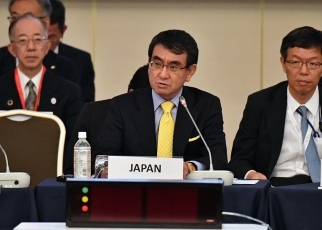
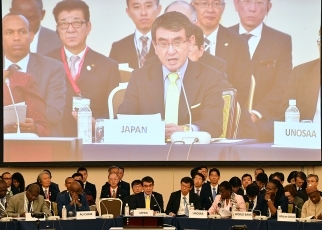

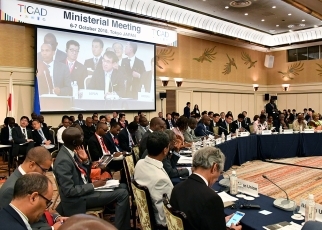
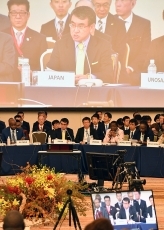
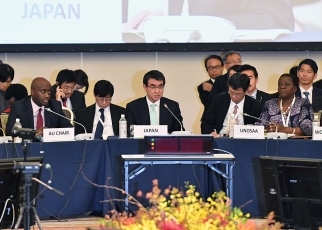
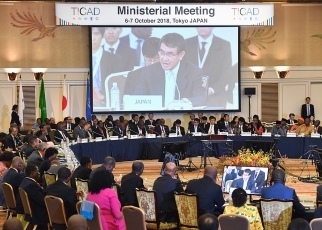
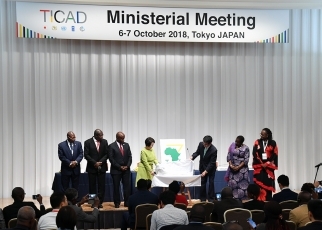
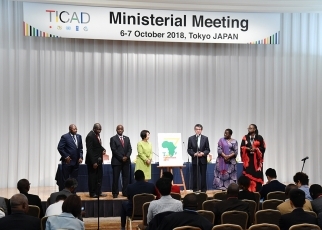
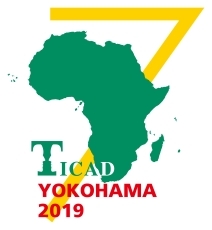
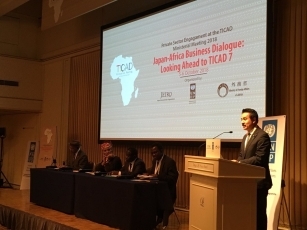
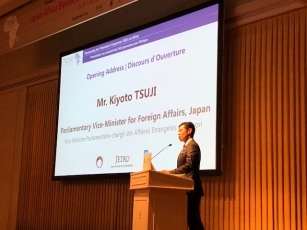
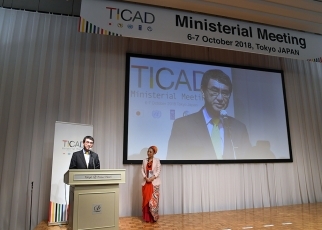
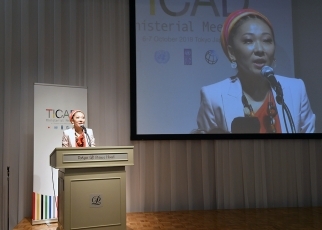
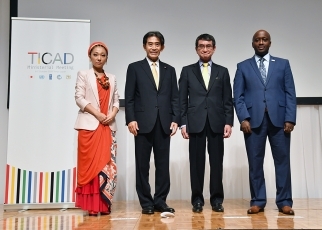
 (Open a New Window)
(Open a New Window)